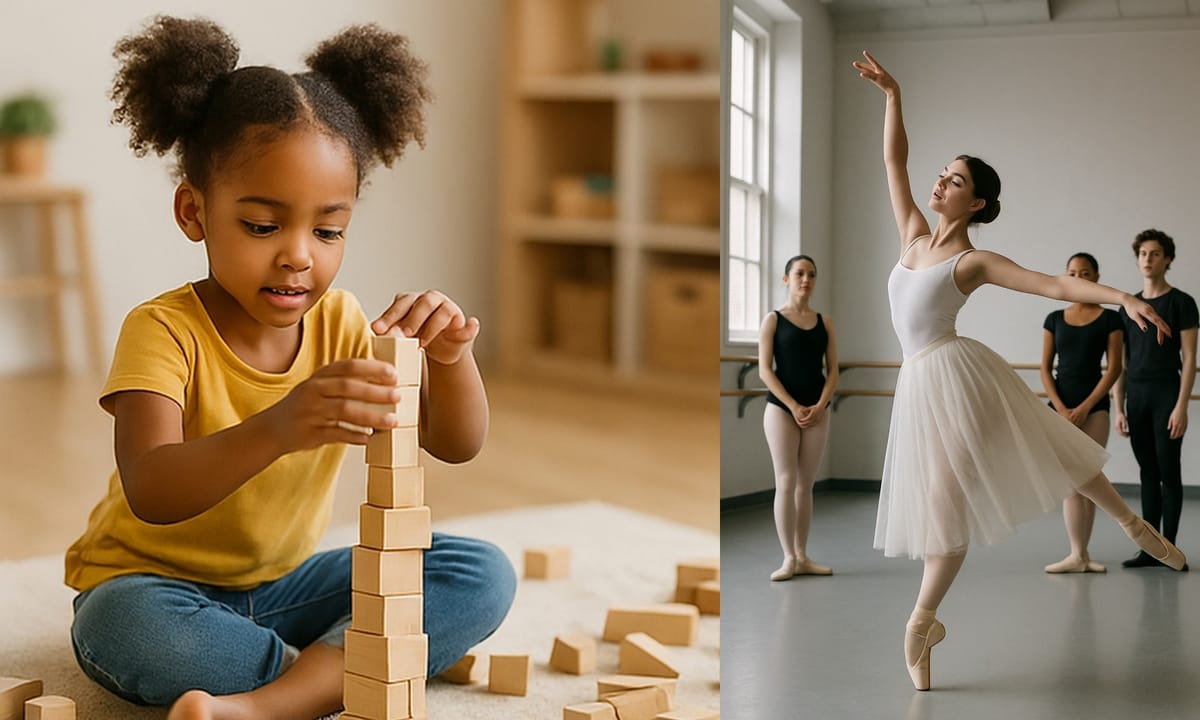Blocks or Ballet?

Both Free and Structured Play Build Growth in Young Children
Introduction
I watched my 4-year-old granddaughter build a zoo out of couch cushions and LEGOs. “Tigers, dragons, and bears live here,” she declared, fully immersed in her world. She needed no guidelines, rules, or instructions, just her imagination.
Later that afternoon, we headed to her dance class. She stood in line, listened to the teacher, followed the routine, and tried her best to copy each move. It was focused, structured, and full of little victories.
Same child. Two different kinds of play. And here’s the thing—they’re both essential.
In our GREATEST roadmap to purposeful parenting, the “G” stands for Growth—a child’s ability to stretch, learn, thrive, and develop through experiences. Free and structured play are powerful tools that support this growth in unique, complementary ways.
Free Play vs. Structured Play: What’s the Difference?
Free play is child-led and spontaneous. It includes activities like pretend games, building forts, drawing freely, climbing a tree, or making up songs. There are no rules or expected outcomes—just creativity and exploration.
Structured play, on the other hand, is adult-guided and goal-oriented. It includes dance or music classes, puzzles, board games, or sports with clear rules and instructions.
Though different in format, both types of play nurture essential life skills:
- Free Play: Sparks creativity and imagination
- Structured Play: Teaches rule-following and discipline
- Free Play: Encourages independence and decision-making
- Structured Play: Builds focus and memory
- Free Play: Fosters emotional expression
- Structured Play: Supports teamwork and cooperation
- Free Play: Allows for open-ended problem-solving
- Structured Play: Develops patience and persistence
How Play Supports Growth
Play is not just fun—it is foundational for development. Through both free and structured play, young children grow in every direction: cognitively, emotionally, socially, and physically.
A 2023 study published in Pediatrics found that children who regularly engaged in both types of play showed improved self-regulation, stronger language skills, and better school readiness compared to those with limited play opportunities (Yogman et al., 2023). Structured play helped children develop focus and social-emotional skills, while free play fostered imagination and resilience.
As parents, offering a variety of play experiences—without pressure for perfection—gives kids the freedom to try, fail, learn, and try again. That’s growth in action.
Practical Ways to Support Growth Through Play
- Create space for free play
Keep open-ended toys accessible such as blocks, art supplies, cardboard boxes, or dress-up clothes. Step back and let your child lead. - Include structured activities
Enroll in a class, play a board game, or do a puzzle together. Patiently guide them, but let them try. - Use outdoor time for both
Let them run wild at the park, then organize a scavenger hunt or group game. - Celebrate effort, not outcome
Whether it’s a messy art project or an offbeat dance move, focus on how they played—not perfection. - Let them be “bored”
Boredom is often the gateway to creativity. Don’t rush to fill the silence—let their imagination come alive.
Encouragement for Parents
You don’t need a perfect schedule or fancy toys. But willingness to say yes to play—in all its messy forms. Growth isn’t about getting it right—it’s about showing up, bonding and learning together.
Reflection Prompt:
What type of play brings out your child’s spark—and how can you encourage a little more of that this week?
Conclusion
Free and structured play are not opposites—they’re partners. Together, they help children grow into curious, confident, and capable humans. And when you say “yes” to both, you’re building the foundation for a lifelong love of learning.
That’s the heart of Growth.
That’s purposeful parenting.
References
Yogman, M., Garner, A., Hutchinson, J., Hirsh-Pasek, K., & Golinkoff, R. M. (2023). The Power of Play: A Pediatric Role in Enhancing Development in Young Children. Pediatrics, 151(2). https://doi.org/10.1542/peds.2022-061185